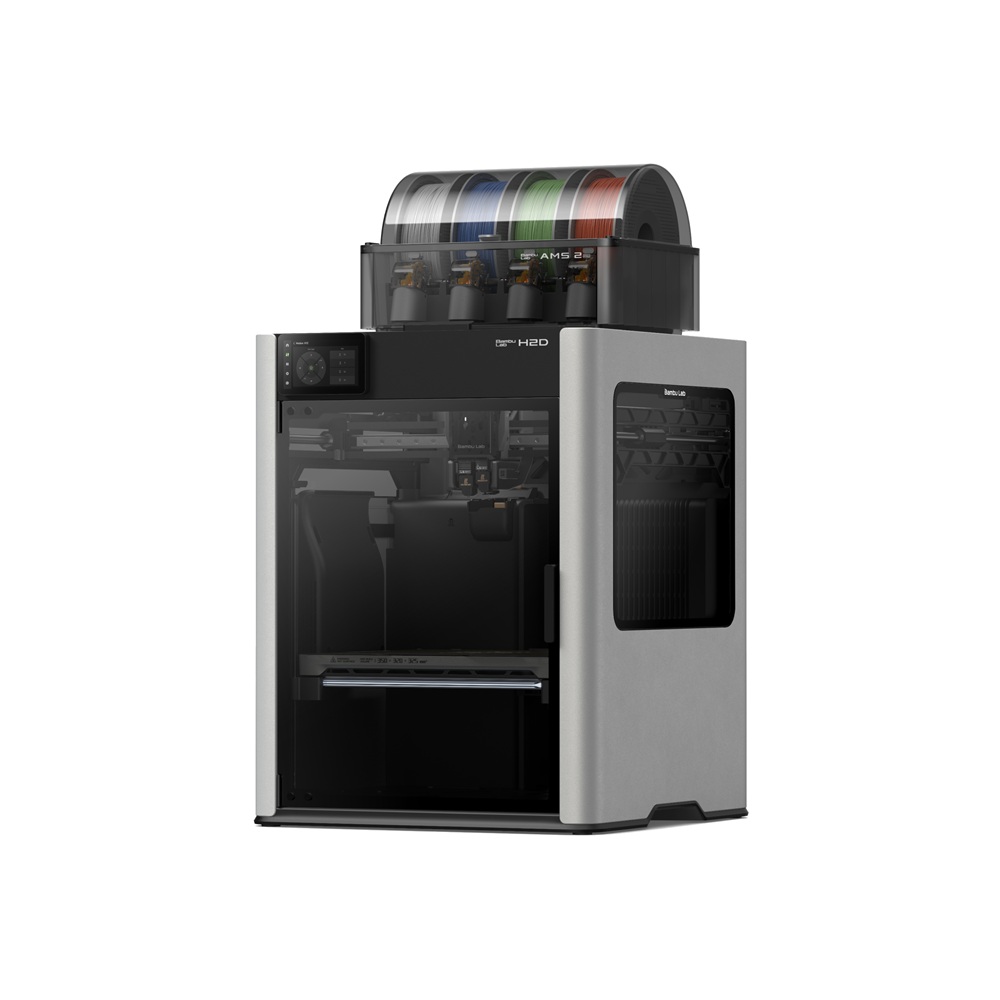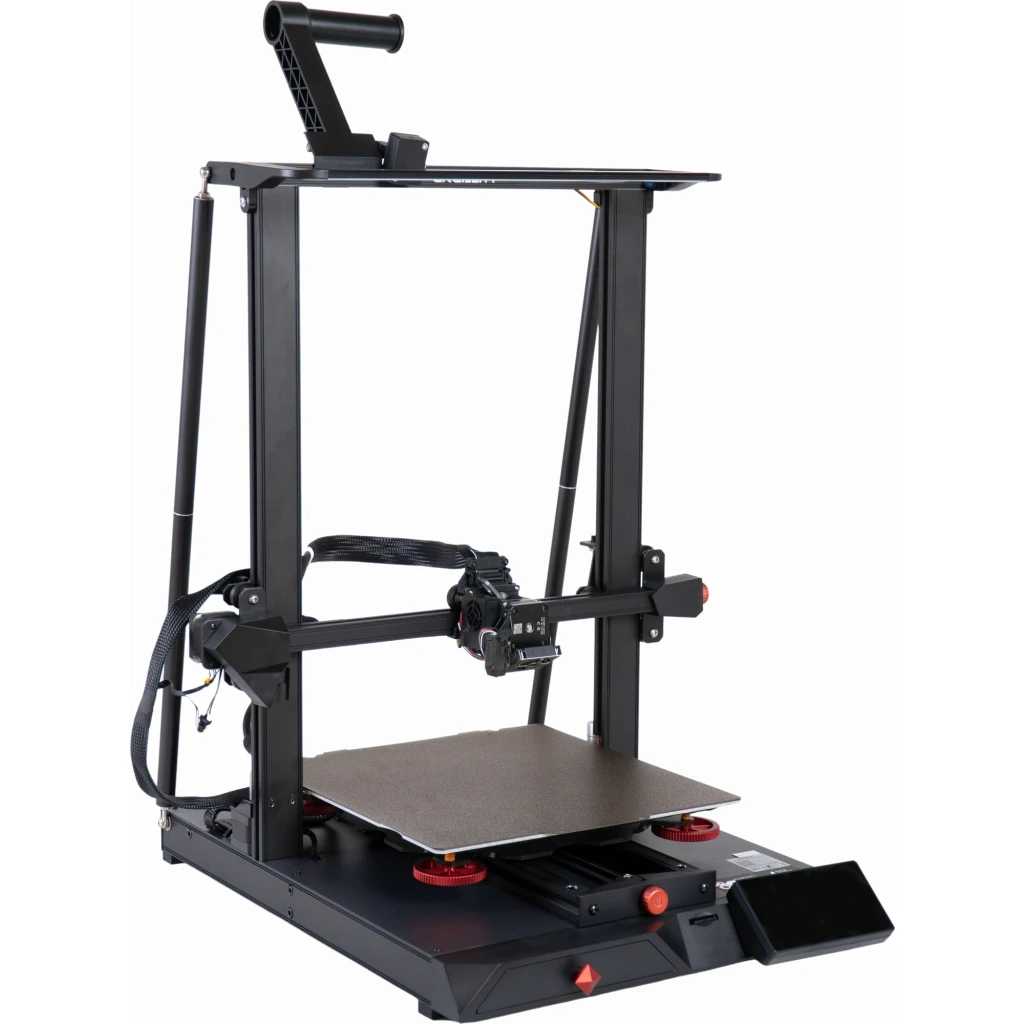Compare H2D vs CR 10 Smart Pro
Comparison between the best 3D printers
Choose the best 3D printer at the best price. The cheapest 3D printers are here.
Buy a 3D printer here with 3D Fila.
 |
 |
|
| Model | H2D |
CR 10 Smart Pro[BUY CR 10 Smart Pro] |
| Printing Material | Filament | Filament |
| Buy Filament for Bambu Lab H2D | Buy Filament forCreality 3D CR 10 Smart Pro | |
| Estimated price | $1899,00 | $900,00 |
| Manufacturer | Bambu Lab | Creality 3D |
| Release Year | 2025 | 2020 |
| Print Volume [mm] | 350x320x325 | 300x300x400 |
| Printer Size [mm] | 492x514x626 | 578x522x648 |
| Weight [kg] | 42,3 | 13,6 |
| Power Loss Recovery | YES | YES |
| Enclosed printer | YES | NO |
| Bed Leveling | Automatic | Manual |
| Filament End Sensor | YES | YES |
| Bed type | Heated | Heated |
| Power supply system | Direct Drive | Bowden |
| Standard nozzle | 0,4 | 0,4 |
| Maximum Nozzle Temperature [°C] | 350 | 300 |
| Maximum Bed Temperature [°C] | 120 | 100 |
| Maximum printing speed [mm/s] | 600 | 50 |
| Filament holder | YES | YES |
| Camera for supervision | YES | YES |
| Recommended filaments | PLA, PETG, ABS, ASA, TPU, PVA, Nylon (PA) | PLA, PETG, Tritan, Flex, ABS |
| Recommended slicers | Bambu Studio | Cura, Simplify, Slic3r, IdeaMaker |
| Maximum Resolution [mm] | 0,01 | 0,1 |
| Processor | ||
| Display | Touchscreen 5'' | Display touchscreen 4,3'' |
| Power Supply | 110/220V / 350W | |
| Connectivity | Wifi, Bambu bus, Cartão SD | SD / USB / Wi-Fi / Ethernet |
| Operating systems | Windows, Mac, Linux | Windows, Mac, Linux |
| Date of registration in the system | 2025-03-31 | 2022-11-04 |
| Release date | 2025 | 2020 |
| Extra features | Bambu Labs H2D combines high-speed 3D printing with a chamber heated up to 65 °C, dual extrusion with automatic nozzle switching, an AMS for filament drying and exchange, and AI sensors that detect failures. It offers optional laser and digital cutting capabilities, features intelligent calibration through computer vision, vibration control, enhanced fire safety, and real-time camera monitoring. | Creality's CR-10 Smart Pro printer offers a large 300x300x400mm build volume, Sprite Pro direct extruder for multiple materials, CR Touch auto-leveling, PEI magnetic bed, 4.3" touchscreen, LED lighting, and Creality Cloud connectivity. Some areas of improvement include the use of brass spindle nuts and tinned wires. |
| Support for multiple colors and materials (AMS and CFS) | YES | NO |
Notes * |
||
| Cost-benefit | 7 / 10 | 6 / 10 |
| Hardware | 7.2 / 10 | 2.5 / 10 |
| Tela | . | . |
| Print volume | 4 / 10 | 4 / 10 |
| Performance | 5 / 10 | 1 / 10 |
| [BUY CR 10 Smart Pro] |
Conclusion |
| In comparing the Bambu Lab H2D and the Creality CR-10 Smart Pro, several key factors emerge that highlight the distinct advantages and disadvantages of each printer. The H2D, being a newer model from 2025, is equipped with advanced features such as high-speed printing, a large build volume, automatic nozzle switching, and enhanced safety measures. Its inclusion of automated features like bed leveling, real-time monitoring through an integrated camera, and a wider range of compatible materials makes it a state-of-the-art option for serious users who prioritize performance and versatility. However, this sophistication comes at a higher price point, which may not be justifiable for all users, especially those who may not require the advanced functionalities. In contrast, the CR-10 Smart Pro, though released in 2020, serves as a solid entry-level option. It offers a respectable print volume and a range of basic features that meet the needs of casual users or beginners. The manual bed leveling and a slightly lower maximum printing speed may pose limitations for those seeking faster production. Nonetheless, its lower price and reliable performance make it a more budget-friendly choice for hobbyists or those new to 3D printing. In conclusion, the choice between the Bambu Lab H2D and the Creality CR-10 Smart Pro ultimately hinges on user requirements. For those who value high-end capabilities and are willing to invest more for cutting-edge technology, the H2D is a compelling option. Conversely, for users seeking affordability and essential functionality, the CR-10 Smart Pro provides a practical alternative without breaking the bank. Each printer has its merits, and potential buyers should assess their specific needs, budget, and intended use before making a decision. |

